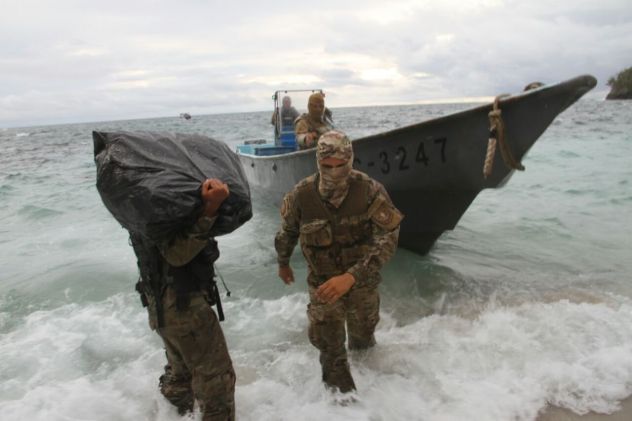In just four operations in the first 15 days of 2018, the Panamanian Public Forces intercepted 1,102 kilograms of cocaine. Units from the Panamanian Air and Naval Service (SENAN, in Spanish) conducted operations on the Pacific coast of Panama.
As church bells still rang in the new year, SENAN interceptor boats patrolled Panama’s Pacific region. Through a maritime traffic control operation, naval units interdicted a speedboat along the southern shores of the central province of Veraguas.
In that first interdiction of 2018, SENAN seized 474 kilograms of cocaine. In the same operation, agents captured the boat’s crew: two Colombian citizens.
According to a statement from the Office of the Attorney General of Panama, “The seizure was made southwest of Coiba. The suspects were aboard an unnamed, 25-foot go-fast boat equipped with 40- and 75-horsepower Yamaha engines.” Both detainees were turned over to Panamanian law enforcement and received an eight-year prison sentence.
First seizures of the year
On January 12th, SENAN seized 224 kilograms of cocaine in two operations. SENAN carried out an operation in the province of Coclé, situated mid-peninsula, southwest of Panama City, where ground unit assets located a vehicle with three people inside. In the vehicle, authorities found 124 kilograms of drugs. That same day, in the waters of the western Pacific along the coast of the province of Veraguas, SENAN located and intercepted a sailboat carrying 100 kilograms of cocaine with two crew members of Panamanian nationality aboard.
Finally, on January 15th, in an operation southwest of the Pearl Islands in the Gulf of Panama, a SENAN patrol carried out the maritime interdiction of a boat manned by three Colombians. As they tried to flee, the crew tossed 20 sacks into the sea, which officers recovered. The sacks contained 404 kilograms of cocaine.
Cracking down hard
 In the first 15 days of 2018, the Panamanian Air and Naval Service seized more than a ton of cocaine along the country’s Pacific coast. (Photo: Panamanian Air and Naval Service)
In the first 15 days of 2018, the Panamanian Air and Naval Service seized more than a ton of cocaine along the country’s Pacific coast. (Photo: Panamanian Air and Naval Service)“There has been a noticeable increase in activity by illegal networks seeking to penetrate our island territory and coastal areas to spread violence, which challenge and threaten our security,” Commissioner Belsio González, director general of SENAN, said. “SENAN will keep cracking down hard on them.”
According to the United Nations Office on Drugs and Crime (UNODC), one kilogram of cocaine is worth $55,000 on the international market. The first seizures of 2018 dealt an economic blow of more than $55 million to narcotrafficking networks.
In its 2017 International Narcotics Control Strategy Report, the U.S. Department of State highlights Panama as being an important bridge for illegal drug transit due to its location. Transnational narcotrafficking organizations move drugs along the Panamanian coast during their journey northward.
Strengthening the fleet
In 2017, the Panamanian Public Forces seized close to 85 tons of drugs, 17 tons more than in 2016. “Over the past year [2017], SENAN managed to seize 33.5 tons of illegal substances [of the 85 tons seized in total], which represents $1.3 million on the U.S. market,” Commissioner Gonzalez said. “One hundred forty-seven people were criminally processed, and 56 boats and 38 weapons linked to these unlawful acts were seized.”
Commissioner Gonzalez explained that SENAN will continue to step up patrols and incorporate new means of transport. In August 2017, U.S. Southern Command donated $1.8 million to SENAN, which included tactical equipment and two Boston Whaler boats to bolster the institution’s response capacity.
The force has 10 speedboats for maritime interdiction. SENAN’s air fleet also added two new helicopters and a plane on January 8th, 2018. The institution is also awaiting the arrival of a multipurpose logistics vessel and a U.S.-made Beechcraft King Air 350 in March, purchases approved by the Panamanian government in late October 2017.
“We’re experiencing a historic moment in which our institution is being supplied with new equipment to enhance the operational capabilities of our air and naval units,” Commissioner González concluded. “[This equipment] will enable us to increase our effectiveness in monitoring and controlling our jurisdictional waters, primarily in our fight against organized crime devoted to narcotrafficking and other related activities, such as weapons smuggling and illegal immigration.”
